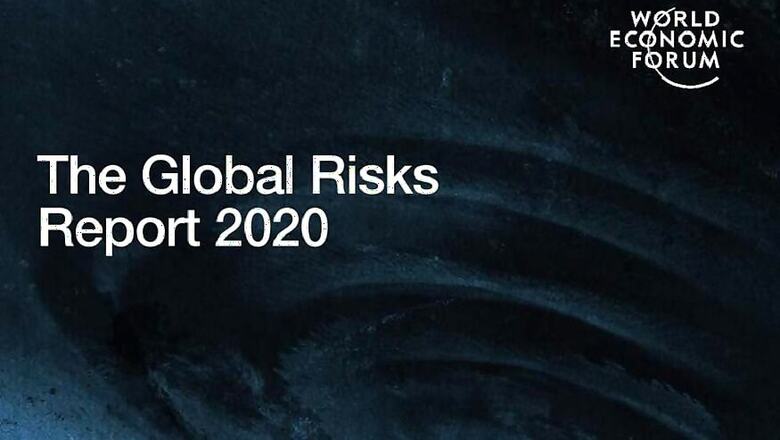
views
London/New Delhi: The five biggest long-term risks facing the world today are environmental in nature, while the immediate risks that are expected to increase in 2020 are economic and G, a new survey showed on Wednesday.
Forecasting a year of increased domestic and international divisions and economic slowdown, the annual Global Risks Report of the World Economic Forum (WEF) said, "geopolitical turbulence is propelling us towards an 'unsettled' unilateral world of great power rivalries at a time when business and government leaders must focus urgently on working together to tackle shared risks."
For the first time in the report's 10-year outlook, the top five global risks in terms of likelihood are all environmental -- extreme weather events, human-made environmental disasters, major biodiversity loss, natural disasters, and failure of climate change mitigation and adaptation.
In comparison, the top global risks a decade ago were dominated by threats to the global economy and financial system.
For the short-term, the top risks that are likely to rise in 2020 are economic confrontations, domestic political polarization, extreme heat waves, destruction of natural resource ecosystems and cyber attacks.
Releasing the survey in London, Geneva-based WEF said a collaboration between global leaders, businesses and policy-makers is needed more than ever to stop severe threats to the world's shared well-being.
The annual global risks report often sets the the news agenda in Davos during WEF's annual meeting and sounds the alarm on both short- and long-term risks.
The 50th annual meeting of Davos is scheduled for January 20-24 and will be attended by more than 3,000 world leaders including heads of state and government, CEOs, civil society members, artists and academia.
"Economic and political polarization will rise this year, as collaboration between world leaders, businesses and policy-makers is needed more than ever to stop severe threats to our climate, environment, public health and technology systems," said WEF, which describes itself as an international organisation for public-private cooperation.
The survey asked over 750 global experts and decision-makers to rank their biggest concerns in terms of likelihood as well as impact and 78 per cent said they expect 'economic confrontations' and 'domestic political polarization' to rise in 2020.
"This would prove catastrophic, particularly for addressing urgent challenges like the climate crisis, biodiversity loss and record species decline," the WEF said.
The report, produced in partnership with Marsh & McLennan and Zurich Insurance Group, pointed to a need for policy-makers to match targets for protecting the Earth with ones for boosting economies and for companies to avoid the risks of potentially disastrous future losses by adjusting to science-based targets.
The topmost risks flagged in terms of likelihood included extreme weather events with major damage to property, infrastructure and loss of human life; failure of climate-change mitigation and adaptation by governments and businesses; human-made environmental damage and disasters, including environmental crime, such as oil spills, and radioactive contamination.
It also flagged major biodiversity loss and ecosystem collapse (terrestrial or marine) with irreversible consequences for the environment, resulting in severely depleted resources for humankind and industries; as well as major natural disasters such as earthquakes, tsunamis, volcanic eruptions, and geomagnetic storms.
The report said unless stakeholders adapt to "today's epochal power-shift" and geopolitical turbulence while still preparing for the future time will run out to address some of the most pressing economic, environmental and technological challenges.
"The political landscape is polarized, sea levels are rising and climate fires are burning. This is the year when world leaders must work with all sectors of society to repair and reinvigorate our systems of cooperation, not just for short-term benefit but for tackling our deep-rooted risks," WEF President Borge Brende said.
To younger generations, the state of the planet is even more alarming. On how risks are seen by those born after 1980, the report said these people ranked environmental risks higher than other respondents, in the short and long terms.
Almost 90 per cent of these respondents believe 'extreme heat waves', 'destruction of ecosystems' and 'health impacted by pollution' will be aggravated in 2020; compared to 77 per cent, 76 per cent and 67 per cent respectively for other generations.
They also believe that the impact from environmental risks by 2030 will be more catastrophic and more likely.




















Comments
0 comment